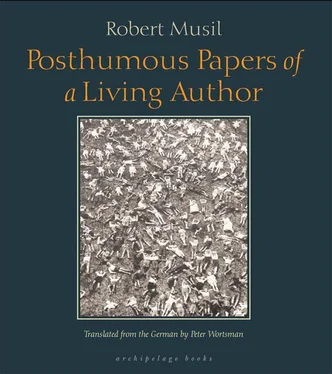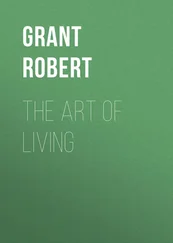So in our childhood, character was what you got a beating for, even though you didn’t have it. There seems to have been a certain injustice in this. Character, my friend’s parents maintained (on one exceptional occasion they demanded it of him and actually sought to make him understand), was the conceptual opposite of bad report cards, skipping school, tin pans tied to the dogs’ tails, idle chatter and clowning around during class, obstinate excuses, faulty memory, and innocent birds struck by the sling of a nasty little marksman. But the natural opposite of all this was, after all, the terror of punishment, the fear of discovery and the pangs of guilt that tormented the soul with the remorse that you felt when things went wrong. That was all; there was no room and no function left over for character, and it was completely superfluous. Still, they demanded it of us.
Perhaps the enlightening words of counsel occasionally spoken to my friend during his punishment were supposed to give him a basis on which to build character, advice like “Don’t you have any pride, son?!” Or: “How can anyone be such a low-down liar?!” But I must say that I still find it difficult to this very day to fathom how anyone is supposed to be proud while getting a beating, or how he’s supposed to demonstrate his pride while bent down over the parental knee. Anger I can imagine; but that’s just what we weren’t supposed to have! And the same holds true for lies: How in the world are you supposed to lie, if not in a low-down way? Awkwardly perhaps? When I think about it today, it still seems to me as though what they really demanded back then was for us boys to be ingenious liars. But thus we were charged with conflicting orders: first, don’t lie; and second, if you have to lie, don’t lie like a liar. Maybe grown-up criminals have mastered this, since in the courtroom it is always held as a particularly dastardly villainy if they committed their crime cold-bloodedly, with malice and forethought; but it was definitely too much to ask of us boys. I am afraid that the only reason I don’t have such a marked absence of character as my friend is that I was not brought up with such painstaking care.
The most plausible of the parental dicta concerning our character was the one that joined its regrettable absence to the warning that we would have need of it as grown men: “And a boy like that wants to become a man!?” is approximately the way it went. The fact notwithstanding that this business about wanting was not altogether clear, the rest at least gave us to believe that character was something that we would be needing later on; so why all these hurried preparations now? This would have accorded altogether with our own way of looking at it.
Even though my friend possessed no character at the time, he did not suffer from the lack of it. That only came later, and began between our sixteenth and seventeenth year. It was then that we started frequenting the theater and reading novels. My friend’s brain, more prone to the dazzling seduction of art than my own, was naively annexed by the villain of the state theater, by the gentle father, the heroic lover, the comic characters, and even the devilish and bewitching femme fatale. Now he only spoke with false inflections, but suddenly possessed all the character of the German stage. If he promised something, you never knew whether you had his word as hero or villain; sometimes he started out perfidious and ended up honest, or the other way around; he would greet us friends with a grumble of displeasure only to switch suddenly to the bon vivant and offer us chocolate bonbons and a chair, or else hug us with fatherly affection and meanwhile steal the cigarettes out of our pocket.
And yet all this was harmless and honest compared to the effects of reading novels. Novels contain descriptions of the most amazing modes of behavior for countless situations. The main drawback, however, is that the situations you actually get yourself into never accord altogether with those for which the novels have prescribed what to do and what to say. World literature is a huge depot in which millions of souls are dressed up with magnanimity, indignation, pride, love, disdain, jealousy, nobility, and meanness. If a worshipped woman steps on our feelings, we know that we are to reply with a reproachfully soulful look; if a scoundrel mistreats an orphan, we know that we are to knock him out with a single punch. But what are we to do if the worshipped woman slams her door shut in our face so that our soulful look never reaches her? Or if a table laden with costly crystal separates us from the scoundrel mistreating the orphan? Shall we break the door down just to cast our sensitive look through splinters; and should we carefully remove the costly crystal before resorting to the indignant blow? In such truly crucial situations, literature always leaves you in the lurch; maybe things will only get better in a few hundred years, when more facets of life are described.
Meanwhile, however, the well-read character always finds himself in a particularly unpleasant fix every time he gets into a so-called real-life situation. He is seething with a good dozen prescribed lines, half-raised eyebrows or clenched fists, backs turned and heaving breasts, all of which don’t really fit the provocation, and yet are not altogether out of place. The corners of the mouth are simultaneously drawn upwards and downwards, the forehead both darkly furrowed and brightly illuminated, and the eyes want at the same time to lunge forward reproachfully and draw back ashamedly into their sockets: this is very unpleasant, for one hurts oneself in the process from all angles. The result all too often is that familiar palpitation and heaving which spreads across the lips, eyes, hands, and throat, sometimes consuming the entire body to such an extent that it twists like a screw that has lost its nut.
It was then that my friend discovered how much more convenient it would be to possess a single character, his own, and started searching for it.
But he stumbled into new exploits. I met him again years later when he had entered the legal profession. He wore glasses, was clean-shaven and spoke in a quiet tone of voice. “You’re looking me over?” he remarked. I could not deny it, something impelled me to seek an answer in his appearance. “Do I look like a lawyer?” he asked. I did not wish to disagree. He explained: “Lawyers have a very particular way of glancing over the rim of their glasses, which is different from the way, say, doctors do it. It might also be maintained that all their words and gestures are more pointed or sharp-edged than the rotund and knotty words and gestures of the theologian. The latter differ from the former as a piece of light journalism from a sermon. In brief, just as fish do not fly from tree to tree, so lawyers are submerged in a medium they never leave.”
“Professional character!” I said. My friend was pleased. “It wasn’t so easy,” he added. “When I started out, I wore a Christlike beard; but my boss forbade it, as it did not accord with the character of a lawyer. Thereafter I comported myself like a painter, and when that was denied me, like a sailor on shore leave.” “For God’s sake, what for?” I asked. “Because I naturally wanted to resist adopting a professional character,” he replied. “The unfortunate thing is that you can’t avoid it. There are of course lawyers that look like poets, and likewise poets that look like grocers, and grocers with the heads of thinkers. But they all have something of a glass eye or a false beard about them, or a wound that hasn’t quite healed. I don’t know why, but it’s like that, isn’t it?” He smiled as he was wont to and added resignedly: “As you know, I don’t even possess a personal character. . ”
I reminded him of his many theatrical characters. “That was only youth?” he proceeded with a sigh. “When you become a man you take on, in addition, a sexual, a national, a state, a class, and a geographical character to boot; you have a writing character, a character of the lines in your hand, of the shape of your skull, and if possible, a character that derives from the constellation of the stars at the moment of your birth. All that is too much for me. I never know which of my characters to follow.” Once again, his quiet smile appeared: “Happily I have a fiancée who claims I do not possess the slightest trace of a character, because I have not yet kept my promise to marry her. I’ll marry her for that very reason, since I can’t do without her healthy judgment.” “Who is your fiancée?”
Читать дальше











